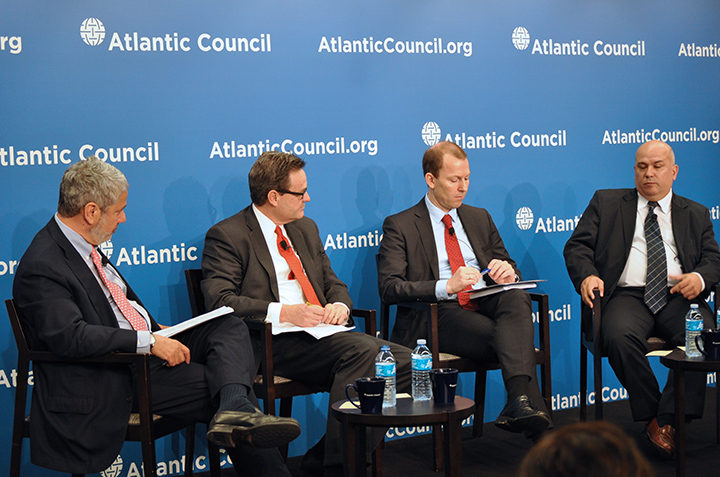 Foreign investment, local support from communities to push policy reform, increased involvement of the international business community, and continued partnership between the United States and Argentina will lead to positive and sustainable political stability and economic growth in Argentina, according to Daniel Poneman, a former US Deputy Secretary of Energy.
Foreign investment, local support from communities to push policy reform, increased involvement of the international business community, and continued partnership between the United States and Argentina will lead to positive and sustainable political stability and economic growth in Argentina, according to Daniel Poneman, a former US Deputy Secretary of Energy.
Poneman spoke at an event hosted by the Atlantic Council’s Adrienne Arsht Latin America Center on March 11. He was joined by Cristian Folgar, a former Undersecretary of Fuels for Argentina; Kurt Vogt, Head of Latin America Commercial Banking Coverage, HSBC; Olafr Røsnes, Energy Counselor, Royal Norwegian Embassy; and Peter Schechter, Director of the Adrienne Arsht Latin America Center.
Argentina has undergone significant political and economic reform since President Mauricio Macri assumed office in December of 2015. Macri has promised to reduce inflation, ease the process behind doing business and investing in Argentina, and shift diplomatic alignment away from Venezuela and Iran. Under Macri, there has been a general thawing in ties between Argentina and major economic powers of the West, including the United States. US President Barack Obama is scheduled to make an official state visit to Argentina at the end of March, following his historic visit to Cuba.
Despite this newfound thaw and climate of reform, the Argentine economy still has a lot of work to do to dispel lingering problems from the previous administration of Cristina Fernández de Kirchner.
“Let’s not underestimate the challenges. Inflation is high, the deficit is now up to 7 percent. The challenges are going to continue. Political institutional challenges are going to continue and will have to be ultimately overcome…This is the best chance since 1983 for Argentina to pivot and sustain in a positive direction,” Poneman said.
Given these challenges, Argentina is still well-placed to succeed because the country’s success is tied to the energy industry. According to Schechter, it is this integration with the energy sector that will define Argentina’s economic growth: “Argentina is a fundamental country in Latin America and today with the new government of President Macri, it is also a potent symbol of change in Latin America. If that change succeeds, one of the most important drivers of that change is going to be the energy sector.”
“Done correctly, changes in energy are going to spur manufacturing, industrial output, and foreign direct investment. So the question is, how do we do it right?” he added.
Doing it right means making sure that enough investment gets to where it needs to be. Folgar noted that “the problems that Argentina is facing right now in the energy sector are not because of a lack of resources, but because of a lack of investment…The only way Argentina can hope to avert this lack of investment is to attract foreign direct investment.”
Folgar recently authored an Atlantic Council report detailing how Argentina can stand to benefit from energy sector reform given Macri’s influence and pressure toward YPF, or Yacimientos Petrolíferos Fiscales—Argentina’s major energy company. The report details how augmented investment and opening of the Argentine energy sector can spur economic growth and sustainability.
YPF is seeing Macri’s diligence to his platform in action. Earlier this week, YPF CEO Miguel Galuccio resigned amid Macri’s executive decision to reform the upper echelons of leadership in the government-owned energy corporation.
This atmosphere of transparency and increased investment reform is becoming more lucid to the global community. According to Vogt, “Macri’s administration has sent very strong signals of what its policies are going to be…these are signals that, as an investor, everyone would perceive something positive is happening here.”
“One piece of good news feeds into the next piece of good news. When things look good, people see an investment opportunity,” he added.
Thus far, Macri has held true to his economic platform. Time will tell whether or not his policies will positively affect Argentina’s place in Latin America and the greater global climate.
Cautious optimism defines the current narrative. “This is a moment of unique opportunity for Argentina to pivot to a sustainable future, but the challenges that remain are structural and it will require a lot of effort to make it work,” Poneman said.
Mitch Hulse is an intern at the Atlantic Council.
Image: From left: Peter Schechter, Director of the Adrienne Arsht Latin America Center, on March 11 moderated a panel discussion with Kurt Vogt, Head of Latin America Commercial Banking Coverage; Olafr Røsnes, Energy Counselor, Royal Norwegian Embassy; and Cristian Folgar, a former Undersecretary of Fuels for Argentina. (Atlantic Council)
